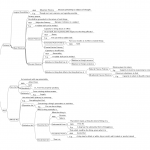This morning, I promised before God and everybody to live according to the Rule of the Lay Fraternities of St. Dominic for the rest of my life. As of this morning, I am now a fully professed lay member of the Dominican order, also known as the Order of Preachers. It seems like a good time to reflect on how I got here.
Many years ago, when I was an Episcopalian, a man I knew became a tertiary of a Benedictine monastery a couple of hours from where we live. (Mind you, it was an Episcopalian monastery—they do exist.) As a tertiary, or third order, he became associated with the monastery and began to live a modified form of the Benedictine rule. I thought that was kind of cool, and filed it away.
Perhaps twelve years ago, I read G.K. Chesterton’s biography of St. Thomas Aquinas, and was much taken with him. St. Thomas Aquinas was a early member of the Dominican Order.
Around eight years ago, I discovered that a blogger I was marginally acquainted with was something called a Lay Dominican: that is, he was a member of the Dominican “third order”. I was still an Episcopalian in those days, but I remember thinking, “I could be a Dominican like St. Thomas Aquinas? How cool is that!”
In the fall of 2007 I returned to the Catholic Church, and by January of 2008 was exploring the Liturgy of the Hours. I hadn’t forgotten about the Lay Dominicans—it’s sometimes a sign of a vocation, when an idea like that just won’t go away—and it wasn’t long before I contacted my local chapter and began attending meetings to discover what it was all about. I was expecting intellectual types speaking learnedly about the writings of St. Thomas Aquinas with real understanding; what I found was a collection of folks mostly older than I, mostly women, and many of them (given where our local Dominican parish is located) Filipinas, who all spoke of God with real devotion. It wasn’t quite what I’d been looking for, but it was all focussed on holiness.
Being a Dominican is a true vocation; you have to be called, and the chapter you join has to be sure you’ve been called. Hence, just like becoming a monk or a nun, becoming a Lay Dominican involves a lengthy discernment process. And here I hit my first road block: the rule says that in order to begin the process, you have to have been a practicing Catholic for at least two years. I’d returned to the Church only a year before.
And so I took a year off. I continued to study, and to pray the hours, and to learn about the Order; and a year later, in the fall of 2009, I came back to begin the process.
In April of 2010, I was formally received into the Order as a candidate, or postulant, and received the Dominican scapular. For a friar, sister, or nun, the scapular is a long, rectangular piece of white cloth that you wear like a skinny poncho, hanging down in front and in back. For a Lay Dominican, the scapular is two small squares of cloth joined by thin cords that you wear around your neck, one square in front and one square in back, under your shirt. It’s a reminder that though outwardly I look no different than anyone else, I’ve set myself aside for God’s use. And I and each of the other postulants took a Dominican saint as a patron, to pray for us and help us along the way. Naturally, I took St. Thomas Aquinas as my patron.
During the postulancy year, I and the other postulants learned about the Four Pillars of Dominican life and the Dominican rule. Though we had as yet made no promises, we all began trying to live the rule, to see whether we could do it.
In April of 2011, those of us in postulancy made our first or “temporary” profession: a promise to live according to the rule for a specific period of time, and were given Dominican crosses to wear. We were now novices.
Making my first profession was a big deal for me. I remember kneeling in the sanctuary at St. Dominic’s, looking up at the stained glass behind the altar: Christ looking stern in the center, flanked by St. Dominic and St. Thomas. And I was received by the chapter, and received the scapular, and looked up, and Christ no longer looked stern, but warm and smiling and welcoming. I had changed, not the glass, but I was very glad to be there.
The novitiate lasts for a minimum of three years. It is a time of discernment: as I said above, being a Lay Dominican is a vocation, a calling, and not all are called to it. The whole point of the novitiate is to give the novice and the chapter an opportunity to find out for sure; and indeed, some of our novices left the chapter before the end of their time as a novice. You can make your temporary profession for the full three years at once, or do it in increments. In my case, my first profession was for one year; in April of 2012 I renewed it for two years. The renewal was outwardly similar to my first profession, but I wasn’t nearly as moved by it; had circumstances permitted I’d have happily made my first profession for the full three years.
Then interesting things started to happen. I attended the Catholic New Media Conference that summer, and met many interesting folks in the on-line Catholic world. As a result of that I began writing for CatholicMom.com; and finally last October began daily blogging here at Patheos. I’d gone from being a book blogger who on every so often wrote about matters of faith to being a Catholic blogger who likes to write about books.
And this morning, I and four others made our life professions and left the novitiate to be full members of the Dominican Order. I had known this was coming, of course, and a few months ago began to think hard about it. Was this really what I wanted to do? Did it make sense? Was I really called to it? And I prayed about it.
It is hard to write about those prayers and the result of them; it was an odd and private experience (and would sound rather silly, I expect, put into pixels). But the answer was clear: yes, I was called to the Order of Preachers, and this was clearly reflected in the turns my life had been taking over the last couple of years.
And now here I am. Outwardly, little has changed; I had already received the scapular and the cross. I’m now eligible to be elected to chapter office (but the next elections aren’t for a while yet). Other than that, it is a matter of simply going on as I’ve been going.
And yet, it all seems new. Gloria in excelsis Deo!
















